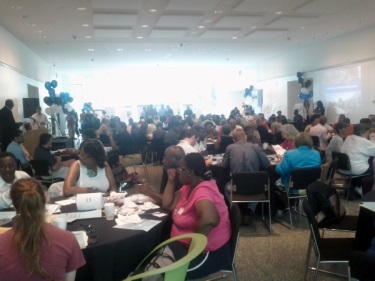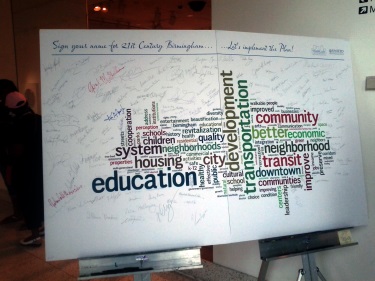 I had the rare opportunity to talk to both of my parents on Monday morning. It’s the way you’d think it would happen given current events; I called my mother in Florida to see if she was feeling any effects from Isaac while my father called me from The Bronx to check on me in advance of the storm’s arrival downstate.
I had the rare opportunity to talk to both of my parents on Monday morning. It’s the way you’d think it would happen given current events; I called my mother in Florida to see if she was feeling any effects from Isaac while my father called me from The Bronx to check on me in advance of the storm’s arrival downstate.
It was coincidental was I was starting to think about what to write about the then pending vote about the future of Cooper Green Mercy Hospital. This is because both of my parents are retired registered nurses having served at two of New York City’s busiest public hospitals. (My mother worked at historic Harlem Hospital in their NICU for nearly two decades while Dad logged 30+ years of weekday evenings in Lincoln Hospital’s triage unit.)
As a result, you grow up hearing about babies born addicted to crack and seeing them about the size of your 10-year old hand. You realize your father doesn’t talk about work that much since, when he started, it wasn’t SoBro but the South Bronx before its transformation started.
They both asked the same question – What will happen to the patients?
It’s apparently a question that former Birmingham mayor Larry Langford pondered correctly back in 2009 – and one that seems to have not been thought through just yet. It’s a question many of us here in Jefferson County are wondering right now. It’s one without an answer – at least not one publicly shared as of yet. It doesn’t look like there’s been a plan introduced to anyone to explain how discontinuing inpatient care at the county hospital will be handled. It’s something you’d think would have already been shared before such a recommendation would be made. It was back on the August 28 agenda for the Jefferson County Commission though and it passed, 3-2.
There are other questions that needed to be answered before looking at the number of beds occupied – something else both of my parents immediately asked about since they both suggested it was an unfair number to use for such decisions – and making such a rash decision.
Can the inpatient services be absorbed by other area hospitals? There seems to be an assumption this can be done, though it doesn’t seem as though the other hospitals were talked to about it. There’s no doubt that some will look at UAB, University Hospital and its various other locations and its continuing expansion and renovation as a logical replacement though it’s a lot harder than you’d think. While there is a working relationship currently between the two entities, it is one grounded in education and not necessarily in management or operations.
Does this put the inpatient beds back in play? Barely mentioned in all of this is the fact that removing inpatient care from the list of services provided by Cooper Green could technically put those beds back into play. It could turn it into a much larger battle over who gets the right to expand and provide additional services to the community. This may include a digital hospital down along Highway 280 or, thinking outside the proverbial box, a new facility that may want to locate near a completed I-22 as people start to consider moving over there to “escape the city.” Before folks start saying it’s a business community push to see this happen, the August 10 statement from the Birmingham Business Alliance (PDF), paints a different picture and echoed requests to see a plan in place before this vote as well.
How will these patients get to and from their inpatient care? Quality transportation options, including mass transit, have been long talked about in this community without any sustained progress being made. We probably need to learn more about when or whether the long vacant executive director position at BJCTA will be filled (it still hasn’t been publicly listed) before we get a straight answer here. This type of conversation needs to be broad in reach and already happening before that person arrives. This becomes more significant since even if other facilities become options, the current hub and spoke bus system in place makes it much harder for some to access health care without a car.
We seem to have placed the cart before the horse with Tuesday morning’s vote. If there is any good news though, we now have a hard date set for these questions to be answered – December 1. If we haven’t dealt with them by then, we need to start thinking about how we truly prepare for progress to be made in metro Birmingham (maybe even in the hands of new caretakers come 2014).
André Natta is The Terminal’s stationmaster.





 It was one of those things where you just felt the level of optimism surrounding you (even as some skepticism tried to sneak in from time to time) and got infected by it. There were approximately 250 people gathered at
It was one of those things where you just felt the level of optimism surrounding you (even as some skepticism tried to sneak in from time to time) and got infected by it. There were approximately 250 people gathered at  We have a chance to offer comment once the draft is released, though for those of you reading this,
We have a chance to offer comment once the draft is released, though for those of you reading this, 

A local's suggestions for digital media moving forward
Editor’s note: While this site’s been quiet about what’s been going on over at The Birmingham News, there’s still been discussion going on elsewhere. Comments made by Scott Schablow caught our eye, leading to our first ever Storify piece and a brief look at what else has been happening out there recently.
http://storify.com/bhamterminal/publishing-in-a-digital-age
As always, we’d appreciate any comments you have.
Leave a comment
Posted in media
Tagged Alabama Media Group, Commentary, suggestions